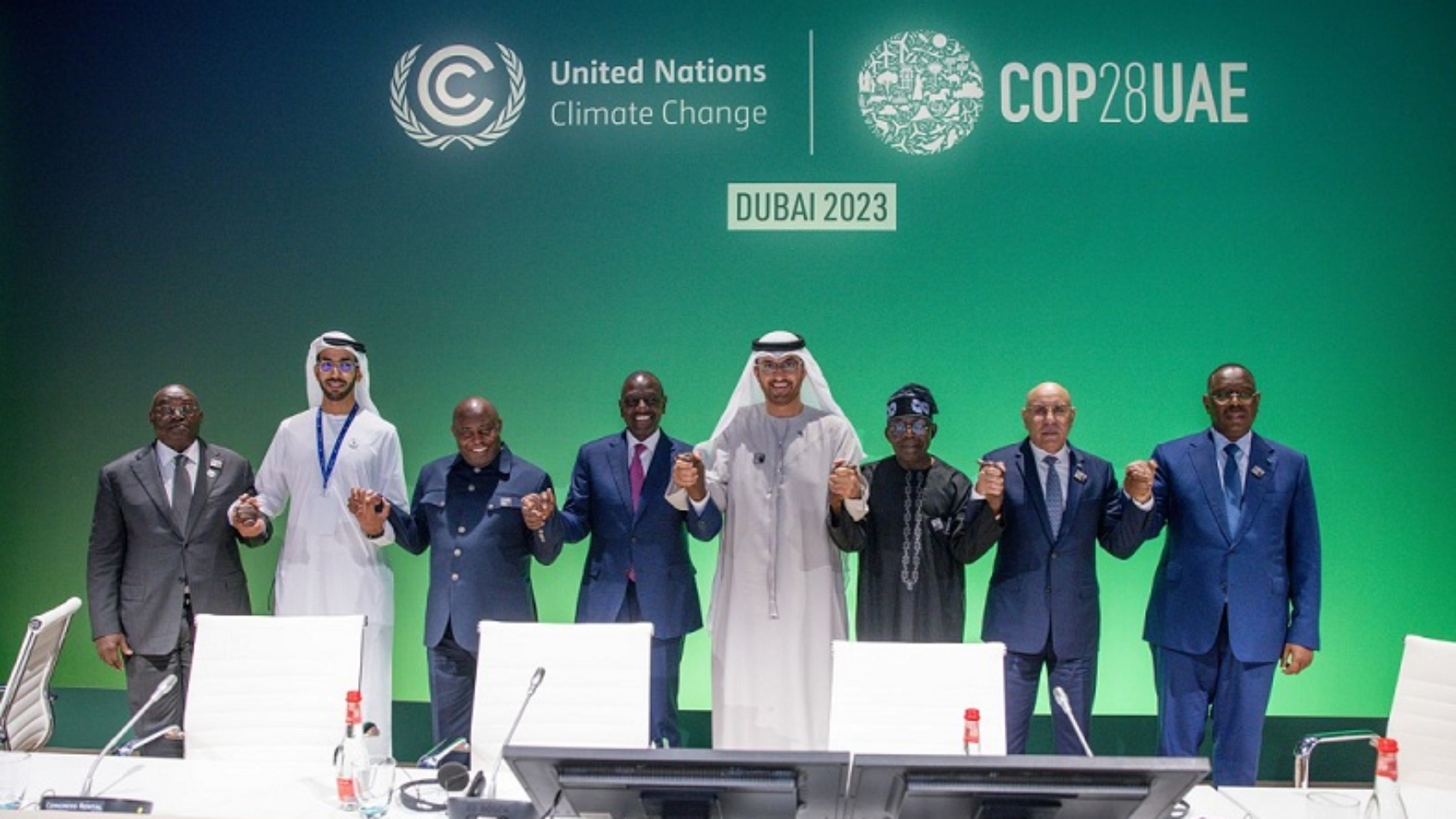By: MaryJane Enchill
Every year, the world meets at what we call the Conference of Parties (COP) to determine ambitions and responsibilities and identify measures for climate action. The COP also reviews and assesses the effect of measures parties have introduced to limit climate change against the overall goal of the United Nations Framework Convention on Climate Change (UNFCCC).
When the COP28 president, Dr. Sultan Al Jaber, CEO of Abu Dhabi National Oil Company (ADNOC), was announced, many people within the climate space felt his election was a mismatch for the climate debate where there were rising calls for keeping fossil fuels on the ground. There were many doubts about what the conference could achieve in a “petrostate,” and Dr. Al-Jaber was considered a fossil fuel mogul.
However, COP28 had a promising start as Dr. Sultan al-Jaber led the opening session on November 30, 2023, with the summit agenda adopted within hours and the funding arrangements for the Loss and Damage Fund operationalized.
The main themes discussed at COP28 have been the Global Stocktake, Fossil fuel phaseout or phasedown, renewable energy targets, carbon markets, loss and damage, climate finance, and adaptation. Here are some We will bring you some highlights.

Climate Finance
The discussions under finance have been to bridge the financing gap between developed and developing countries by setting a climate goal for 2030 and beyond and addressing calls to double the adaptation finance.
It would be recalled that in 2009 at COP15, developed countries pledged to mobilize $100 billion per year by 2020 for developing countries to combat climate change through mitigation and adaptation activities, and to date, this goal has not been achieved. This failure was because the decision was politically motivated and not necessarily science-based. To correct this mistake, the New Collective Quantified Goal (NCQG) on climate finance is being negotiated to set realistic targets and ensure a more effective approach to climate finance. The NCQG is to raise the floor of climate finance above $100 billion annually to address the needs and priorities of developing countries and is set to be adopted at COP29 next year. The main issues to be addressed in the NCQG include the quantity, quality, accountability, additionality, and transparency of climate finance.
But so far, negotiations on this item have primarily focused on procedural or methodological matters, with moderate political sensitivity and slow progress. This makes it unlikely that any concrete decision will be made on this crucial topic at this year’s COP28.

Loss and Damage Fund agreed – But money is a drop in the ocean
Loss and damage in the context of climate change is an irreversible destruction and loss of lives and livelihoods resulting from climate change. Hence, the decision to establish the loss and damage fund was celebrated as a historic success of COP27 in Egypt. Despite the many dissenting views on the need to establish a different funding mechanism, the big news of the first day of COP28 was that countries reached an agreement to set up the loss and damage fund, with the UAE immediately pledging USD 100 million. Pledges flowed from other countries, including Germany, the UK, the USA, Japan, and the EU, totaling USD 726 million (€674 million).
Regardless, climate activists are unsatisfied with the total amount pledged because the amount is nothing compared with the profits oil industries are making.
According to a report by the International Energy Agency (IEA), the profit of the oil and gas industries jumped to $4 trillion (€3.7 trillion) in 2022. Meanwhile, the irreversible economic and non-economic impact that the loss and damage fund seeks to address is estimated at $400 billion (€371 billion) annually. This puts the current pledges at just 0.2 percent of developing countries’ cost of climate breakdown.
Energy Transition – Phase out and phase-down of fossil fuel
Contrary to the public outcry regarding the election of Dr. Sultan Al Jaber as COP28 president, negotiations at COP28 have focused, among other critical issues, on decarbonizing the energy sector and many calls to fast-tracking the energy transition.
We have witnessed momentum in the first week of COP28, with over 85% of the global economy, representing 123 countries endorsing goals to triple renewable energy capacity BY 2030 and energy efficiency.
The prominent bone of contention at COP28 has been the issue of fossil fuel phaseout or phase down by 2030. What is the difference? To phase out means a shift from coal, oil, and gas until their use is eliminated – thus a complete end, while to phase down is understood to mean a reduction in fossil fuel use but not a complete end.
The phaseout/phase-down language has become a flashpoint for many oil, gas, and coal-producing countries.
We observed that while Chile, the EU, and others want the final COP28 deal to include a clear call on phasing out fossil fuel use, Saudi Arabia, Russia, and others are pressing down on any mention of fossil fuel phase-down.
Meanwhile, the US and China have avoided the terms altogether. Negotiators are thus looking for alternative wording that will still signal a shift from fossil fuels by the 2030s.
Global Stocktake – COP28 Success definer
One of the significant concerns and perhaps the most important text to finalize at COP28, which could also determine the success or otherwise of COP28, is the global stock take (GST). The GST is a two-year assessment of progress made by countries in implementing their nationally determined contributions towards addressing climate impacts. With the assessment results being very disappointing, the big agenda at COP28 is to negotiate a text on fossil fuel phase-out or phase-down in the global stocktake of progress to limit temperature rise to 1.5C, as agreed in the Paris Agreement. We notice that the current draft text has retained the fossil fuel phase-out language, but the decision to maintain or delete it is yet to be taken – by the end of COP.
Shocking and dramatic
One shocking and dramatic issue of the first week was the COP President revealed to have said that there was “no science” behind the call for fossil fuel phase-out. Upon receiving backlashes from climate campaigners, he quickly held a press conference to state that he was taken out of context and that phasing out or phasing down fossil fuels was “inevitable and in fact essential.” A COP28 spokesperson further defended progress made at the summit by stating that about 51 oil companies were invited to COP28 to agree to decarbonization targets.
Declarations and Announcements
- 11 pledges and declarations launched and received mixed levels of multinational support in areas including agriculture, health and peace.
- $83 billion (€76.9 billion) in financial pledges and contributions mobilized in just five days of the summit.
- $467 million pledged for urban climate action.
- Launch of the Coalition for High Ambition Multi-Level Partnerships (CHAMP) with 65 countries
Rest Day at COP28
On Thursday, 7 December 2023, the official negotiations paused for a day’s rest. As the conference resumes today, Friday, 8 December 2023, we look forward to tackling the finer details of negotiation texts for the second week.
Meanwhile, President Al Jaber has signaled a goal to close the summit on schedule – thus, December 12 at 9 am during an open dialogue held with observers and parties last Wednesday.
Considering that eight years of the last COPs have stretched over by 24 hours, including COP26 in Glasgow and COP27 in Egypt, closing on time would have been a great feat the climate talks would have chalked under his leadership.

